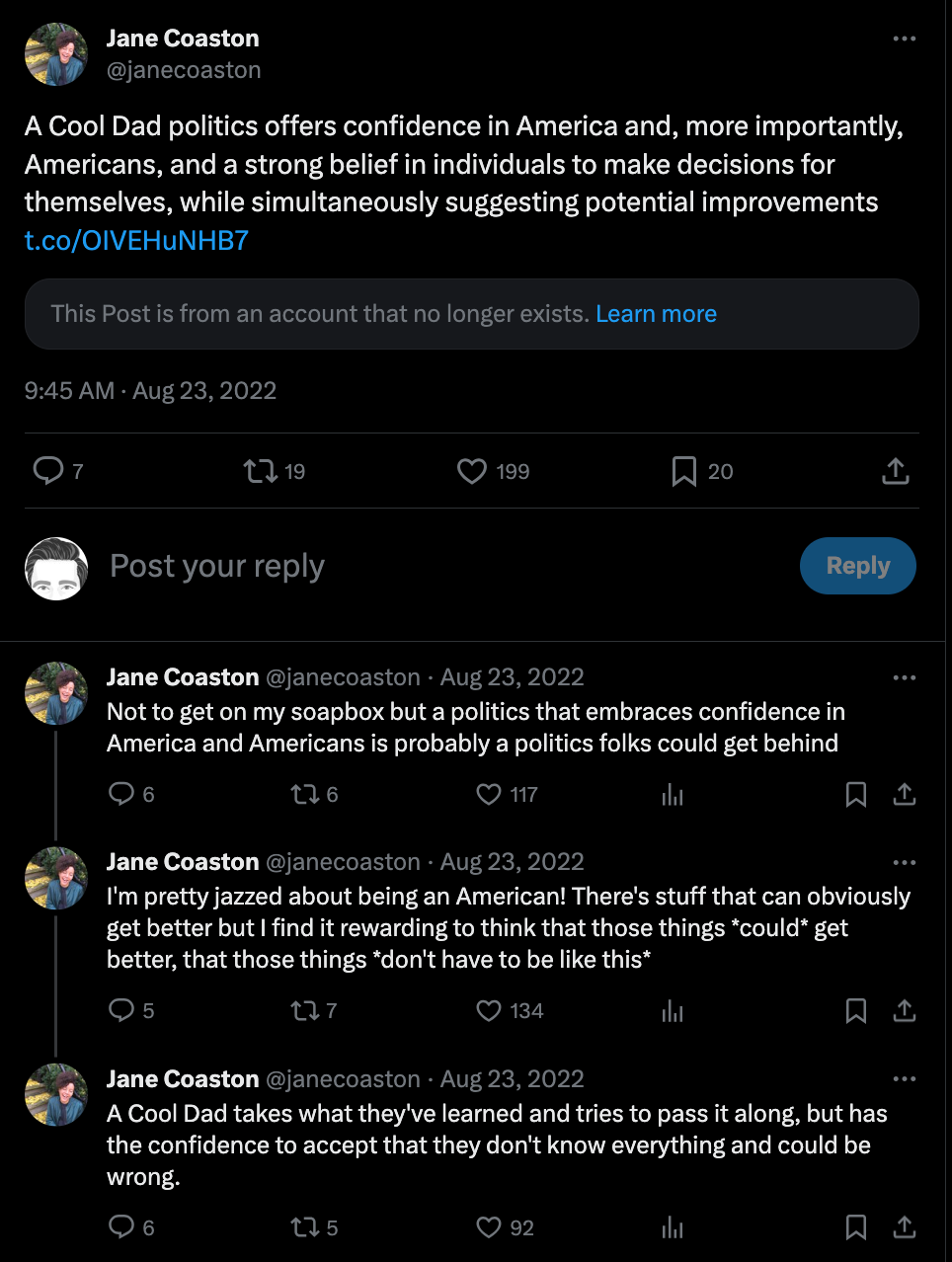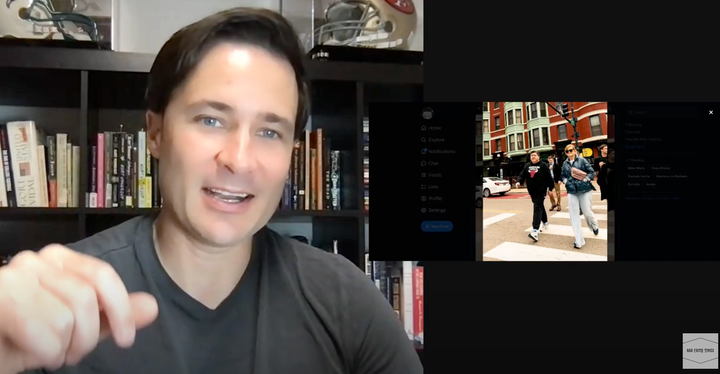The Politics of The Cool Dad

I’m going to break some news here and tell you human beings don’t like to be critiqued.
I once coached a flag football team that included kids with various degrees of athletic experience and prowess, and quickly learned (the hard way) that my messaging to these children had to be carefully tailored. There was not, unfortunately, a one-size-fits-all model for how to tell kids they’re doing something wrong and need to improve.
Some of my flag footballers responded positively to straightforward criticisms of how they were running a play or throwing a ball or catching a ball, eager to get better and, I suppose, please their sweaty coach, pretending he knew what he was doing. For these kids, a critique was not interpreted as an attack, but as a helpful suggestion for how to do something slightly better. Maybe they thought this would lead to more playing time, or more snaps at high-leverage positions in a league that forced teams to deploy a quarterback rotation. And you what? They were right.
Support Bad Faith Times today
The problem, I learned (the hard way), was assuming every child would respond well to honest assessments of their various efforts on the practice field. Stop trying to snatch the ball out of the air, I’d tell a receiver. You gotta step when you throw, and for the love of god, follow through, I’d tell a quarterback. Don’t give up on the play just because an opponent evaded your flag grab attempt, I’d tell a defender who seemed uninterested in snatching a flag.
Sometimes I’d get heated, not because I was upset with a kid, but because I wanted them to improve and, eventually, enjoy the thrill of victory and impressing their teammates and family members in attendance, things of that nature. And in those moments, some of my kids would shut down or melt down. These children in no way wanted to be told they were doing something – anything – incorrectly. Some would cry. Others would get mad and tell me I was the one who was wrong, since they could do nothing wrong. It was all quite maddening until my mom reminded me that I was exactly the same as a kid. I did not want any coaching feedback that did not include telling me how wonderful I was, how utterly perfect I had performed on the field.
A critique? A suggestion? No thank you, sir. My baseball swing is just fine. My jump shot requires no improvement. My putting is as good as it’s gonna get. I’ve practiced a lot, coach. Trust me. Don’t injure my ego by telling me something I don’t know.
It’s why a politics of criticism and shame is a nonstarter in the United States (and elsewhere, I’d presume). You don’t rally people to a cause or candidate by making them feel guilty, or telling them they’re ignorant, or convincing them their lives must be changed dramatically in ways they might find frightening. You can’t, in short, tell people they’re wrong.
Enter Cool Dad Politics.
‘I Don’t Know Much About Much’
Among the American right’s myriad ideologically structural advantages over the left is the following selling point: Nothing you do is wrong and anytime anyone questions your actions or motives, remember that God is on your side.
Destroy the planet with unceasing pollution because it is your god-given right. Run roughshod over the rights of The Other because it benefits you and yours. Vote for lawmakers hawking ultimately destructive economic policies because it might put a few bucks in your pocket tomorrow. None of these things is wrong, and anyone who says otherwise is not just misguided, but a disciple of Satan.
The center-left and left, meanwhile, are left to suggest that people should improve society somewhat, and maybe – just maybe – make a sacrifice or two in service of these modest aims. Maybe we could tax capital gains or send some money to desperately poor families every month or make preschool free via new taxes. Perhaps we could turn down the thermostat slightly. Things like that. It never goes well. Just ask Jimmy Carter.
There is, I think, a middle ground in appealing to what I would call normie voters who are generally turned off by Republican messaging but do not, under any circumstances, want to be told they’re wrong. It’s Cool Dad Politics, as coined by the New York Times’ Jane Coaston, who posted about this political theory with great eloquence in 2022.

You’re not going to beat the self sufficiency – or at least the idea of self sufficiency – out of Americans. It is central to who we are; Bernie Sanders’ 2016 campaign could’ve recognized this and tweaked its social democratic messaging. Every one of us for generations has been taught since birth that we’re on our own, and success and failure is our choice and our choice alone. You, the good Bad Faith Times reader, know this is bullshit, that there is no such thing as meritocracy, and that your lot in life is mostly determined by your family’s wealth, or lack thereof. It’s not that an American can’t be happy unless they’re born into money, but that the trappings of success – cars, big-ass houses, fancy vacations, veneers, hair plugs, butt implants – are almost entirely given, not earned.
The idea of self sufficiency, of an equal playing field, of pulling oneself up by the bootstraps, is so deeply ingrained into the American ethos, there’s no use in fighting it (maybe I’ve gone soft in my old age; I’m not discounting that). Determining one’s own fate is such a powerful cultural and political idea – one that Republicans have used time and again to trick people into voting for lawmaking majorities that only want to cut taxes for people with a helicopter landing pad on their yacht in exchange for kids not getting a free lunch at school or medical care, or, you know, something luxurious like an occasional beach trip or video game.
It’s a romantic idea: You’re born on to this earth having been granted the ability to determine whether your life turns out good or bad. There are no external factors – just you and the world. Sometimes it’s couched as You vs. The World and sometimes it’s You And The World, but either way, you are the central character and have full power over your life, your journey, all that shit. It’s a deeply appealing idea to a nation of delusional optimists being told by the TV to work harder and smarter and longer.
We have commercials glorifying folks working a second job overnight and grabbing a McDonald’s breakfast sandwich before heading to their day job. We have movies and shows where characters skip meals and forgo sleep and shortchange relationships so they can more efficiently climb the ladder and make all the money. The inspiration porn industrial complex on Instagram and TikTok and Facebook urges desperate people to work a little bit harder if they want their various dreams to come true. In this environment, there is vanishingly little chance of countering the Cult of Self Sufficiency.
Jane Coaston’s Cool Dad Politics, I think, offers a way to appeal to the fiercely independent among us while offering a softer kind of politics more amenable to humanitarian goals and even socialist policies.
The left has to project confidence in the American project. Without that, you have nothing politically. For all of Barack Obama’s bitter disappointments during his eight years in power, the man never wavered in his confidence that we could be better versions of ourselves. I appreciated that as a 25-year-old campaigning for Obama in the Virginia suburbs after two terms of pure dystopia with George W. Bush in the White House. Obama’s confidence gave me a lift. I was able to hold my head up high, if only for a while.
The key to Cool Dad Politics is to combine that confidence with an everyman aura. It is important not to be too smart for the Average Joe, and this – as Coaston says – is easily achieved if a politician accepts “that they don’t know everything, and could be wrong.” Americans love a dumb candidate, someone with whom they can have a beer or crazy right-wing coffee and talk like a normie. Obama, for one, had to downplay his intelligence on the campaign trail. He knew he had to trick people into thinking he was an idiot, like them. The tragically aristocratic Mitt Romney tried the same thing to disastrous results. Donald Trump, meanwhile, has a built-in advantage as an aggressively ignorant man who doesn’t know what he doesn’t know.
When my dad starts a sentence with, “I don’t know much about much,” I know for sure that he’s about to unleash a take about something for which he knows nothing about. It could be about the climate change hoax or about poor people having cell phones and microwaves or January 6 insurrectionists being jailed for going on a tour of the Capitol. By saying he doesn't know much about much, my dad is strategically leaving room for me to push back and tell him he’s wrong. Because, see, my dad knows he’s probably wrong since he’s never actually looked into these topics, but only heard about them from some bloviating haircut on Fox News or OAN.
Obviously it’s not ideal to use this linguistic technique when you’re about to unleash a torrent of ignorance. I think it can be a useful part of Cool Dad Politics though. Admitting that you might not have all the answers is very much compelling to an American electorate that does not want to be talked down to, or to vote for someone who has read a book. It would go something like this:
“I don’t know much about much, but I believe hard-working American families should be able to put food on the table and send their kids to quality schools.”
“I don’t know much about much, but the American worker should be able to go to the doctor without fearing bankruptcy.”
“I don’t know much about much, but I don’t think our children should have to go to school with a fear of being shot down.”
See: I could be wrong (I’m not), but I’m just a simple man offering simple solutions. I’m a cool dad. I don’t even like politics. This is the essence of Cool Dad Politics.
The trouble, of course, is whether a large enough swath of the U.S. population wants hard-fought solutions to vexing problems, or if they just want someone to tell them what’s best – a person who can do everything themselves while we kick back and watch a little TV. As Kurt Vonnegut wrote in his 1987 book, Bluebeard: Americans are but “spoiled children who are begging for a frightening but just daddy to tell them exactly what to do.”
(If you're into dad-related media, check out the Dad Szn Show, my new YouTube show in which I discuss the challenges of being a parent in the 21st century. Like and subscribe, things of that nature.)
Follow Denny Carter on BlueSky at @cdcarter13.bsky.social and on Threads and X at @CDCarter13.



Comments ()